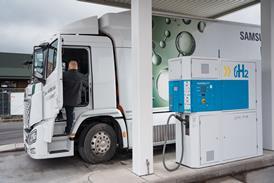Neste and Scania are piloting a digital solution that makes it easier to follow up and verify the usage of renewable fuels. The solution combines data from Scania’s Fleet Management Portal with Neste’s fuel emission data, allowing fleet management customers to receive accurate and up-to-date information on their greenhouse gas emissions. This information can then be used to compare the climate impact of their use of Neste’s MY Renewable Diesel and track their progress towards their climate goals.

The pilot project involves logistic companies, including HAVI, and aims to solve the challenge of verifying the extent to which trucks are actually running on renewable fuels. In the future, the solution could serve all types of renewable fuels and be used by all manufacturers.
Mats Hultman, Head of OEM Partnerships at Neste, explains the purpose of the collaboration as testing “how to verify the use of renewable fuels and accurately report the climate impact.” The climate data is now digitally accessible, whereas before it was mostly collected manually. The successful pilot in Finland has encouraged Neste and Scania to consider expanding the solution to new markets.
Jacob Thärnå, Head of Sustainable Transport at Scania, says, “Scania’s purpose is to drive the shift towards a sustainable transport system.” The collaboration with Neste is part of this mission, as it enables “access to reliable, accurate and automated emissions calculations that could be used both in daily operations but also showcase the credibility of renewable fuels in the ecosystem.”
Massimo D’Alessandro, Director Sustainability & Innovation at HAVI, says, “HAVI is committed to net zero emissions by 2050 and we’re proud to work with our customers and partners to provide increasingly sustainable, digitally enabled and transparent supply chain solutions.” With a significant portion of HAVI’s European delivery fleet powered by alternative fuels such as electrification, biogas, and renewable diesel, the digital solution from Scania and Neste provides automatic reporting on the real GHG reductions achieved.
Mats Hultman concludes, “Together with Scania and our piloting customers, we aim to demonstrate how climate data can create additional value and push the logistics industry towards lower emissions.” The pilot project is a customer-centric solution that demonstrates the importance of collaboration in the industry value chain when developing new solutions to combat climate change.













